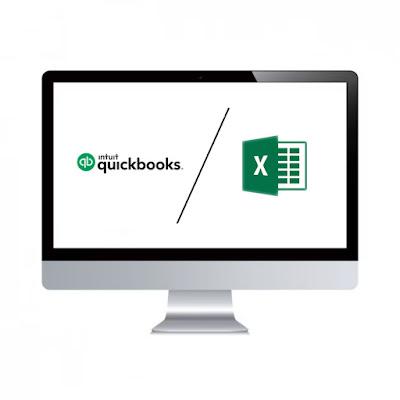
Managing finances is a crucial aspect of running any business. However, as simple as it may sound, managing financial data can be overwhelming and time-consuming. This is where accounting tools like QuickBooks and Excel come into play. Both have their unique features that can simplify the process of tracking expenses, creating invoices, and generating reports. But which one is better for businesses? In this blog post, we will compare QuickBooks vs Excel and help you make an informed decision on which tool to choose for your financial management needs!
QuickBooks vs Excel Key Differences
QuickBooks and Excel are two popular tools used by businesses for accounting. While QuickBooks vs Excel both have their advantages, there are key differences that set them apart.
One of the main differences between QuickBooks vs Excel is that QuickBooks is a dedicated accounting software while Excel is primarily a spreadsheet application. This means that QuickBooks has more advanced features when it comes to financial management tasks like invoicing, payroll processing, and inventory tracking.
Another difference lies in the level of automation each tool offers. With QuickBooks, you can automate many repetitive tasks such as recurring invoices or bill payments. On the other hand, Excel requires manual input for every calculation and task.
Additionally, QuickBooks allows multiple users to access and work on data simultaneously while maintaining accuracy and security measures with user permissions. In contrast, sharing an Excel file among several people can lead to confusion or errors if not done carefully.
While both tools have their strengths depending on your business needs one may be better suited than the other for managing finances effectively.
What is QuickBooks?
QuickBooks is a cloud-based accounting software created for small and medium-sized businesses. It's designed to streamline various financial processes such as invoicing, expense tracking, payroll management and tax preparation.
The software comes with an array of user-friendly features that allow business owners to manage their finances effortlessly. QuickBooks automatically syncs bank transactions, categorizes expenses and generates reports, making it easy for users to keep track of their cash flow.
Another great feature of QuickBooks is its customizable dashboard which gives users a quick overview of the most important financial information. The dashboard can be tailored according to individual preferences so users can easily access the tools they use most often.
Furthermore, QuickBooks offers several integrations with other business tools like Shopify, PayPal and Square. This allows businesses to centralize all their operations in one place making it easier for them to manage everything from sales orders to inventory management.
QuickBooks provides businesses with an efficient way of handling complex finance processes while giving them more time to focus on growing their business.
What is Excel?
Excel is a software program developed by Microsoft that allows users to organize, store and manipulate data in spreadsheets. At its core, Excel is designed to help businesses and individuals manage large amounts of data quickly and accurately.
One of the primary features of Excel is its grid-like interface, where users can input numerical data into individual cells organized in rows and columns. Users can also customize each cell with formulas or functions that allow them to perform complex calculations on their data.
Beyond basic spreadsheet functionality, Excel also offers powerful tools for visualizing and presenting data. This includes charts, graphs and other visual representations that make it easier for businesses to identify trends or patterns in their financial information.
Excel has become an essential tool for businesses across industries thanks to its versatility, ease of use and ability to handle large sets of complex financial data with ease.
QuickBooks vs Excel Features
QuickBooks and Excel are both powerful tools that offer different features for financial management. QuickBooks is specifically designed for accounting tasks, while Excel can be used for a variety of purposes beyond just managing finances.
One of the key features of QuickBooks is its ability to automate bookkeeping tasks such as invoicing, bill payments, and payroll. These automation features help businesses save time and reduce errors in their financial records.
Excel, on the other hand, offers more flexibility in data manipulation and analysis. It allows users to create custom formulas to analyze data sets and visualize results through charts and graphs. This makes it ideal for conducting complex financial analyses or creating customized reports.
Another advantage of using QuickBooks over Excel is that it provides real-time access to financial information from any device with an internet connection. This feature enables business owners or managers to monitor cash flow regularly, which helps them make informed decisions quickly.
In contrast, Excel files need to be manually updated every time new transactions occur before they provide accurate information about a company's current financial status.
Both QuickBooks and Excel have unique features that make them useful tools for managing finances in different ways depending on what your business needs are. Businesses should consider their specific requirements when deciding which tool would work best for them.
QuickBooks vs Excel Pricing
The pricing is one of the crucial factors that businesses need to consider when choosing between QuickBooks vs Excel for their financial management. Excel comes with a one-time purchase cost, which can range from $139.99 to $399.99 for the Microsoft Office Suite depending on the version you choose.
On the other hand, QuickBooks offers different pricing plans based on your business needs and budget. The self-employed plan starts at $15 per month, while the advanced plan costs up to $150 per month.
Each of these plans offers unique features that cater to specific business requirements. For instance, if you run a small business with fewer employees and basic accounting needs, then you might find that the Simple Start or Essentials plans are suitable for your company's needs.
However, suppose your business has more complex accounting requirements such as payroll management or inventory tracking; in that case, opting for higher-priced plans like Plus or Advanced will be a better option.
Both QuickBooks vs Excel offer flexible pricing options tailored according to businesses' varied financial management needs and budgets. It is essential to evaluate your accounting requirements carefully before settling on any software solution that best suits them.
Which is better for businesses?
When it comes to choosing between QuickBooks and Excel for financial management, the answer depends on the specific needs of your business.
QuickBooks is a dedicated accounting software that offers features such as invoicing, expense tracking, and payroll management. It automates many tasks that are time-consuming with Excel, helping you save valuable hours. If you have a large business or multiple clients, QuickBooks can help you manage all your finances efficiently.
On the other hand, Excel is great for businesses that require more customization in their financial reporting. With its powerful formulas and data analysis tools, Excel allows users to create custom reports tailored to their unique requirements. This level of flexibility enables businesses to get granular insights into their finances.
In terms of cost-effectiveness, both options have different pricing structures depending on usage levels and feature sets required by each customer segment. For small businesses or startups with limited budgets, using Excel may be an attractive option since it's already included in most Microsoft Office subscriptions.
Ultimately whether QuickBooks or Excel is better for your business will depend largely on how complex your financial situation is and what type of functionality you need from a finance tool.
How to get started with QuickBooks or Excel
Getting started with QuickBooks or Excel can seem daunting at first, but with a little bit of guidance, it's easy to get up and running. For those looking to use QuickBooks for their financial management needs, the first step is to sign up for an account and choose a subscription plan that suits your business requirements.
Next, you'll need to set up your company profile in QuickBooks by inputting basic information such as company name and address. You'll also need to link any bank accounts or credit cards associated with your business so that transactions can be automatically imported into the software.
For businesses opting to use Excel for their financial tracking needs, getting started is even simpler. All you need is access to Microsoft Excel on your computer. From there, create a new spreadsheet and label each column based on the type of data you want to track (e.g. income, expenses).
Once these columns are set up in either program, it's simply a matter of inputting data as it comes in and regularly reviewing reports generated by either software. With consistent effort put towards maintaining accurate records using either QuickBooks or Excel, businesses can see significant improvements in their financial management processes over time.
Conclusion
After analyzing the key differences, features, and pricing of QuickBooks vs Excel, it's clear that both tools have their own strengths and weaknesses.
Excel is a great tool for small businesses with simple bookkeeping needs or those who are just starting out. It's easy to use and widely available. However, as your business grows in size and complexity, it may become difficult to manage all financial data solely on Excel.
QuickBooks offers advanced features such as inventory management, payroll processing, invoicing, reporting analytics and more which can simplify financial management for businesses of any size. Although it comes at a higher cost than Excel but its intuitive design saves time by automating many manual processes.
Note: choose QuickBooks if you're looking for an all-in-one solution to automate your accounting tasks or want more accurate reports and insights into your finances; choose Excel if you're just starting out or only need basic bookkeeping functions. Regardless of which one you choose make sure that you keep track of every penny because good bookkeeping is essential for successful business growth!

